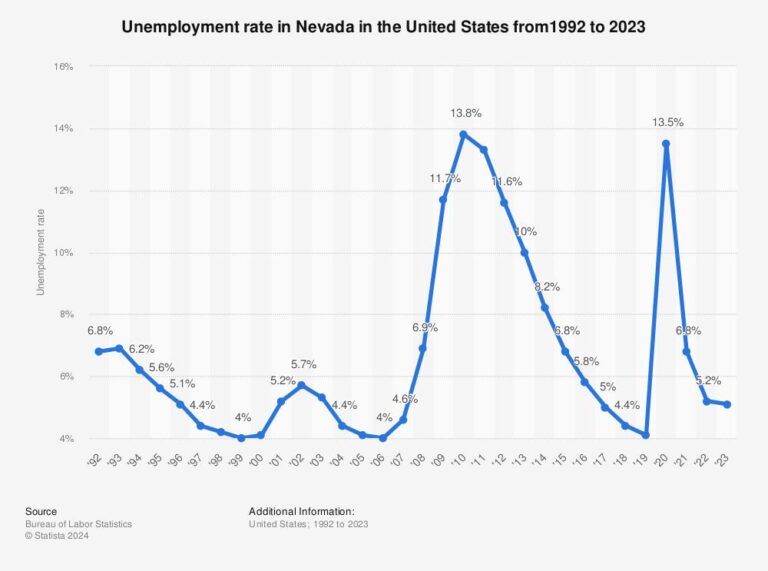Las Vegas Unemployment Trends Amid Economic Rebound
Although the United States has experienced a broad economic upswing, Las Vegas remains burdened with one of the nation’s highest unemployment rates. The city’s labour market continues to face notable headwinds, largely due to its dependence on tourism, which remains unpredictable, alongside a constrained labor pool and inflationary pressures affecting both employers and job seekers. Unlike other urban centers that have seen steady employment growth, Las Vegas struggles with seasonal employment swings and a disconnect between job openings and the skills of its workforce.
Core industries that traditionally drive the local economy—such as hospitality, entertainment, and retail—have yet to fully recover from the pandemic’s impact. Analysts identify several key reasons behind the sustained elevated unemployment:
- Changing tourism dynamics that have lowered demand for service sector jobs.
- Worker reluctance due to ongoing health concerns and the influence of extended unemployment benefits.
- Structural challenges including transportation limitations and a shortage of affordable housing options.
| Industry | Unemployment Rate (%) | Recovery Progress |
|---|---|---|
| Hospitality | 9.3 | Behind schedule |
| Retail | 7.8 | Moderate advancement |
| Construction | 6.1 | On the rise |
| Healthcare | 4.5 | Strong recovery |
Root Causes Behind Las Vegas’s Elevated Unemployment
Las Vegas’s unemployment woes stem from a blend of cyclical and structural factors. The city’s economic foundation is heavily weighted toward hospitality and entertainment sectors,which were disproportionately affected by recent economic disruptions. Despite efforts to rebound, uncertainties in tourism flows, seasonal employment variability, and fluctuating visitor numbers continue to limit stable job availability for many residents.
Additional obstacles include a skills mismatch between job seekers and emerging industry demands, a lack of economic diversification, and escalating housing costs that hinder workforce retention. The main contributors to the ongoing unemployment challenge include:
- Tourism volatility influenced by global economic conditions and public health developments.
- Workforce skill deficiencies slowing the pace of reemployment in new sectors.
- Concentration of economic activity primarily in gaming and hospitality, limiting broader job creation.
- Increasing cost of living prompting workers to relocate or seek employment outside the region.
| Cause | Effect on Employment |
|---|---|
| Tourism Instability | Significant job losses in service sectors |
| Skill Shortages | Delayed workforce reintegration |
| Economic Concentration | Limited expansion beyond core industries |
| Housing Affordability | Risk of workforce displacement |
How Unemployment Impacts Local Businesses and Community Services
The sustained high unemployment rate in Las Vegas has placed considerable strain on local enterprises. With fewer residents earning consistent wages,consumer spending has declined sharply,adversely affecting retail outlets,dining establishments,and service providers. Many small businesses report shrinking daily revenues, leading to workforce reductions or shortened operating hours. This economic pressure threatens the diversity and vitality of the local marketplace, complicating recovery efforts.
The repercussions extend beyond commerce, impacting community services that depend on steady funding and volunteer support. Social programs designed to assist vulnerable groups are experiencing heightened demand amid constrained resources. Areas most affected include:
- Community health centers managing increased numbers of uninsured or underinsured patients
- Nonprofit groups facing volunteer shortages and financial shortfalls
- Educational initiatives encountering budget cuts and program reductions
| Industry | Consequences | Community Impact |
|---|---|---|
| Retail | Decline in customer visits and sales | Job losses and store closures |
| Food Service | Reduced patronage | Shortened hours and layoffs |
| Healthcare | Higher patient volumes | Resource strain and longer wait times |
| Education | Funding cuts | Elimination of programs |
Approaches to Enhance Job Growth and Workforce Skills in Las Vegas
Addressing Las Vegas’s persistent unemployment requires innovative and multifaceted strategies. Efforts are increasingly focused on broadening the economic base beyond tourism and hospitality by fostering growth in technology, healthcare, and renewable energy sectors. Collaborative ventures between public agencies and private enterprises have launched specialized training programs aimed at equipping residents with the competencies needed for these expanding fields.
Additional measures support entrepreneurship and small business development to invigorate local job creation and economic resilience. Key workforce development initiatives include:
- Scaling up vocational education and apprenticeship opportunities
- Improving access to career guidance and job placement resources
- Investing in infrastructure projects that generate immediate employment
- Partnering with educational institutions to tailor curricula to labor market demands
| Initiative | Focus Area | Projected Outcome |
|---|---|---|
| Technology Bootcamps | Details Technology | Creation of 500+ tech jobs annually |
| Renewable Energy Training | Green Energy | 300 skilled workers by 2025 |
| Entrepreneurship Grants | Small Business Development | Support for 200+ startups |
Conclusion: Navigating Las Vegas’s Economic Future
As Las Vegas continues to contend with one of the highest unemployment rates in the country, the pressure mounts on policymakers and community leaders to devise lasting economic solutions. The ongoing joblessness highlights the city’s struggle to fully recover from recent economic shocks and underscores the critical need for focused workforce development and economic diversification. The success of these initiatives will be pivotal in determining the region’s economic stability and growth trajectory in the years ahead.




